The health benefits of Buckwheat Honey vs Manuka Honey are researched and compared for their remarkable antibacterial activity and nutritional value. Health-conscious consumers are turning to more natural products for remedies and healing. Stocking your natural medicine cabinet includes picking the right herbs, oils, superfoods, and yes, honey!
Jump to:
Different types of honey contain unique organic compounds that have powerful healing properties. Manuka honey has been studied extensively over the years and recognized for its powerful antioxidant properties and ability to speed the healing process for many bacterial infections, including staphylococcus aureus.
Recently, clinical studies suggest that raw buckwheat honey contains antibacterial effects comparable to Manuka honey, with even more antioxidant activity! In this article, we will compare the origins, uses, and benefits of each type of honey and how to pick the best quality product for your needs.
This article is designed for informational purposes only. As a Holistic Nutrition Specialist, I follow trends in nutritional studies and intend to share information to help one become an active participant in their own unique health journey. Always remember, before making any changes to your healthcare routine, be sure to discuss them with a qualified physician.
What is Buckwheat Honey?
Buckwheat honey is a variety of honey made from the nectar of buckwheat flowers. It has a distinct dark color, ranging from dark amber to almost black, and a strong, robust flavor.
Buckwheat honey is known for its rich, molasses-like taste with a hint of malty or nutty undertones.
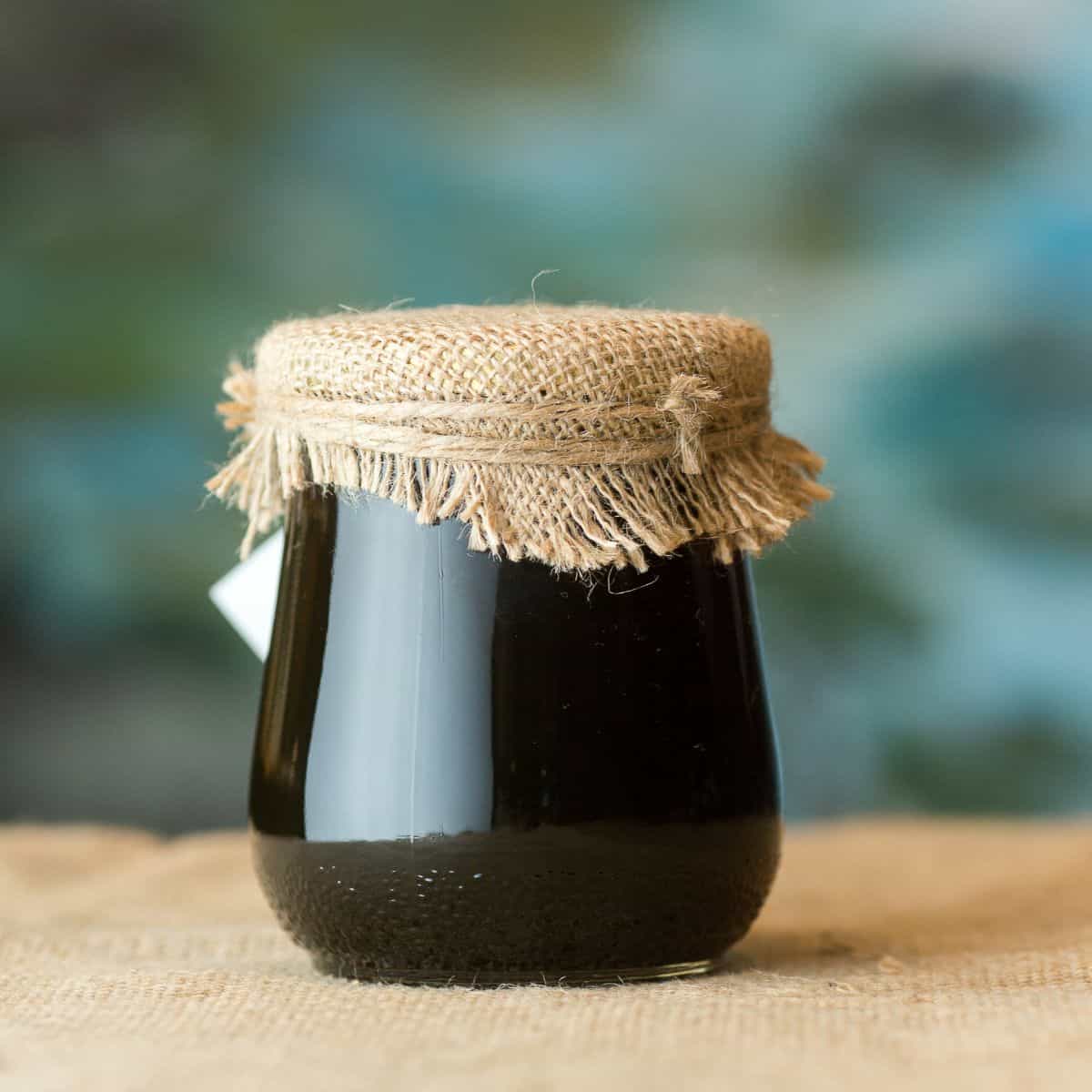
Compared to other types of honey, buckwheat honey is typically darker, thicker, and has a more intense flavor profile. Buckwheat honey tastes strong, typically with a robust sweet taste and a slight bitterness that some people find appealing.
Its bold flavor can vary depending on the region and the specific characteristics of the buckwheat plants.
The Buckwheat plant grows all over the world, and its honey is often cultivated in North America, (particularly Northern United States and Canada), Eastern Europe (such as Russia and Ukraine), and China.
Buckwheat honey is often sought after for its potential health benefits. As we mentioned in our post dark vs light honey, dark honey, is known to contain higher concentrations of antioxidants compared to lighter-colored kinds of honey.
Additionally, it may have higher levels of certain minerals and beneficial compounds, including iron, zinc, and rutin.
Due to its distinct taste and nutritional qualities, buckwheat honey is often used as a natural sweetener in various culinary applications. It can be enjoyed in teas, drizzled over pancakes or waffles, used in ice cream, baking recipes, salad dressings, or added to savory dishes for a unique flavor profile.
 Sandt's Buckwheat Honey, Un...Shop on Amazon
Sandt's Buckwheat Honey, Un...Shop on Amazon
 Goshen Amish Country Honey ...Shop on Amazon
Goshen Amish Country Honey ...Shop on Amazon
 Stakich Buckwheat Antioxida...Shop on Amazon
Stakich Buckwheat Antioxida...Shop on Amazon
Buckwheat Honey Benefits
The health benefits of Buckwheat honey are supported by its nutrient profile and unique antioxidants. While specific studies on buckwheat honey are limited, the following benefits are associated with its components:
- Antioxidant Protection: Buckwheat honey contains various antioxidants, including phenolic compounds like flavonoids and phenolic acids. These antioxidants help neutralize harmful free radicals in the body, potentially reducing the risk of chronic diseases and supporting overall health. Studies have shown buckwheat honey to have a higher level of antioxidants compared to other honey varieties, even manuka honey!
- Healthy Source of Energy: Like most pure honey, Buckwheat is a natural source of energy when used in moderation. Its low glycemic index also makes it a better choice than the highly processed table sugar. For those who prefer to avoid all sugar, check out our post on natural sweeteners monk fruit vs swerve vs stevia. If you are interested in learning about other natural sweeteners that are also a natural source of energy, have a look at date syrup vs maple syrup or agave vs maple syrup posts.
- Wound Healing: Some research suggests that buckwheat honey may have wound-healing properties. Its antioxidant and antibacterial properties may help protect against infection and promote healing. In this study, researchers found that Buckwheat honey, particularly from New York had a high phenolic content and antibacterial activity. This made researchers conclude that Buckwheat may be effective in speeding up wound healing and slowing the growth of bacteria.
- Cough and Sore Throat Relief: Buckwheat honey has been traditionally used as a natural remedy for coughs and sore throats that accompany respiratory infections. Studies have shown that it can be even more effective than OTC medications in reducing cough symptoms in children, especially when taken before bedtime. It is believed to soothe throat irritation and act as a cough suppressant. However, it's important to consult a healthcare professional before giving honey to children under the age of one due to the risk of infant botulism.
- Mineral Content: Buckwheat honey contains minerals like iron, zinc, and manganese, which are essential for various bodily functions. Iron is important for red blood cell production, zinc supports immune function and wound healing, while manganese plays a role in antioxidant defenses and bone health.
- Potential Anti-Inflammatory Effects: Some studies have indicated that the antioxidants present in buckwheat honey may have anti-inflammatory properties. These effects may help reduce inflammation in the body, potentially benefiting conditions such as arthritis, and inflammatory bowel diseases, and even may prevent the growth of cancer. The potential anti-cancer effects of honey are promising and are currently being studied more closely.
What is Manuka Honey?
Manuka honey is a unique and highly regarded type of honey produced in New Zealand. It is derived from the nectar of the Manuka tree, a native plant. What sets Manuka honey apart is its high concentration of a compound called methylglyoxal (MGO), which is responsible for its healing properties and benefits.
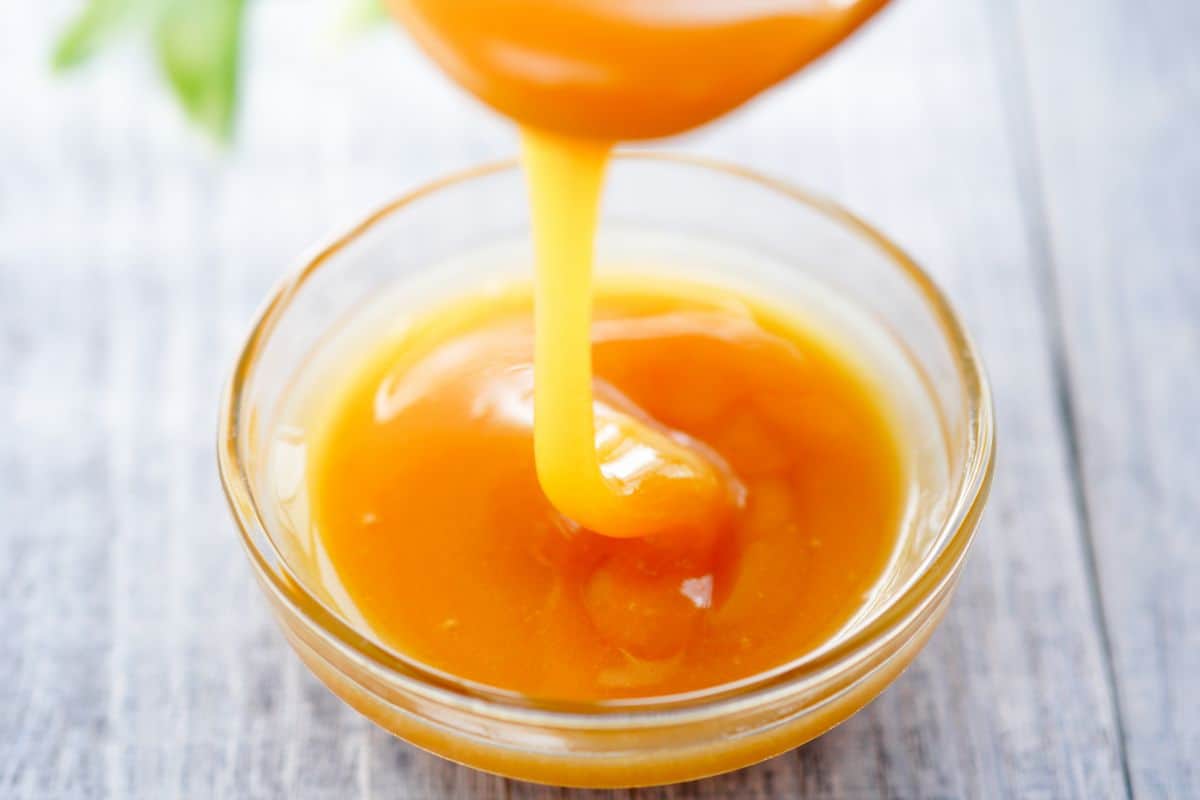
Known for its potent antibacterial activity, Manuka honey is often used as a natural remedy for wound care, sore throats, stomach ulcers, and other bacterial infections. As mentioned in our light vs dark honey article, Manuka is one of the exceptions to the rule. Commonly, with traditional honey colors, dark-colored honey contains more antioxidants and health benefits. Manuka, however, is a lighter-colored honey and one of the most antioxidant-rich types of honey available.
Manuka is almost exclusively cultivated in New Zealand. In order to find the best quality manuka, it is advisable to first ensure the company you are purchasing from is a New Zealand-based company. The second requires that you understand what level of MGO is needed or desired for your specific needs.
 New Zealand Honey Co. Raw M...Shop on Amazon
New Zealand Honey Co. Raw M...Shop on Amazon
 Kiva Raw Manuka Honey UMF 2...Shop on Amazon
Kiva Raw Manuka Honey UMF 2...Shop on Amazon
 New Zealand Honey Co. Raw M...Shop on Amazon
New Zealand Honey Co. Raw M...Shop on Amazon
Manuka Grading
In our helpful article, MGO vs UMF, we explain the special grading system that is unique to Manuka Honey. It is graded based on its MGO content, with a higher rating indicating greater antibacterial potency. The UMF® (Unique Manuka Factor) grading system verifies the authenticity and quality of Manuka honey, considering both MGO content and other compounds.
Apart from its medicinal uses, Manuka honey can be enjoyed for its rich, earthy flavor and used as a natural sweetener or in various culinary applications. When purchasing Manuka honey, it is important to choose reputable brands that provide accurate labeling and ensure the honey's authenticity. For more information on how to find reputable Manuka Honey Retailers and products, consult our handy guide. This guide also explains in more detail the incredible benefits of Manuka Honey.
Choosing the Best Quality Honey
Manuka Honey has a grading system with varying levels of concentrated antioxidants and antibacterial properties. These are measured using two separate systems that determine the quality, concentration, and sourcing. Buckwheat and other types of honey, on the other hand, do not have a grading system that determines antioxidant activity.
When choosing the best quality buckwheat honey, a key consideration is opting for raw and unfiltered honey varieties. Raw buckwheat honey is minimally processed. This ensures that it retains its natural enzymes, nutrients, and beneficial compounds. Check out this post about the differences between Raw Unfiltered Honey and Organic Honey.
Unfiltered buckwheat honey maintains the presence of pollen and beeswax particles. These factors can contribute to its unique flavor and potential health benefits.
Look for labels indicating that the buckwheat honey is raw and unfiltered. This ensures you are getting a high-quality, minimally processed product. These characteristics are often associated with premium buckwheat honey. These options offer the fullest expression of its natural flavors and benefits.
To take it a step further, consider researching the company's reputation for sustainable practices and beekeeping.
Buckwheat vs Manuka Compared
Buckwheat honey and Manuka honey are distinct types of honey with different characteristics and properties. Here's a comparison between the two:
- Source: Buckwheat honey is derived from the nectar of buckwheat flowers. Manuka honey comes from the nectar of the Manuka tree (Leptospermum scoparium) in New Zealand.
- Flavor: Buckwheat honey has a robust, malty flavor with earthy undertones. Manuka honey has a strong, distinctive taste characterized by herbal and caramel notes. The flavor profiles of the two kinds of honey are quite different.
- Color: Buckwheat honey typically has a dark amber to almost black color. In contrast, Manuka honey ranges from a creamy white to a dark amber hue.
- Unique Components: Recent studies have shown that buckwheat honey contains antioxidants and phenolic compounds, contributing to its health benefits. More extensive studies have been done to conclude that Manuka honey, on the other hand, is distinguished by its high concentration of methylglyoxal (MGO), which is responsible for its potent antibacterial properties.
- Antibacterial Properties: Both buckwheat honey and Manuka honey have antibacterial activity. Manuka honey is renowned for its strong antibacterial effects. This is due to its high MGO content. It gives a broader spectrum of antimicrobial action compared to most other types of honey. Buckwheat honey also exhibits antibacterial activity. However, it does not have a specific grading system to determine the potency of its antibacterial properties like Manuka honey does with its MGO and UMF® rating systems.
- Availability and Origin: Buckwheat honey is produced in various regions globally. The United States, Canada, and Eastern Europe are a few, depending on buckwheat cultivation. Manuka honey, on the other hand, is primarily sourced from New Zealand and parts of Australia. This is due to the Manuka tree's native habitat.
- Cost: Because of availability and extensive testing to determine rating and quality for Manuka, it tends to be more costly. When used for medicinal purposes, such as wound care only a small amount is typically needed. This makes it last quite a while and can be kept in the medicine cabinet to be used as needed. With this understanding, many believe that the larger price tag is quite worth it! For those who are looking for a less expensive remedy, Buckwheat is a very comparable and affordable option!
Conclusion
While both kinds of honey offer potential health benefits, including antibacterial properties, Manuka honey is renowned for its potent antibacterial activity.
On the other hand, buckwheat honey's antibacterial activity is newly researched and acknowledged, but it lacks a standardized system to distinguish its antibacterial potency. The choice between the two depends on personal preference, flavor profile, intended use, and availability in specific regions.
We hope this article on the Antibacterial Benefits of Buckwheat Honey vs Manuka Honey has helped you gain a greater understanding of two of nature's finest types of honey. Have you tried honey for medicinal purposes? How about as a natural sweetener? The benefits and uses are many! Let us know in the comments below what you think!
Have a healthy day,
Natalie

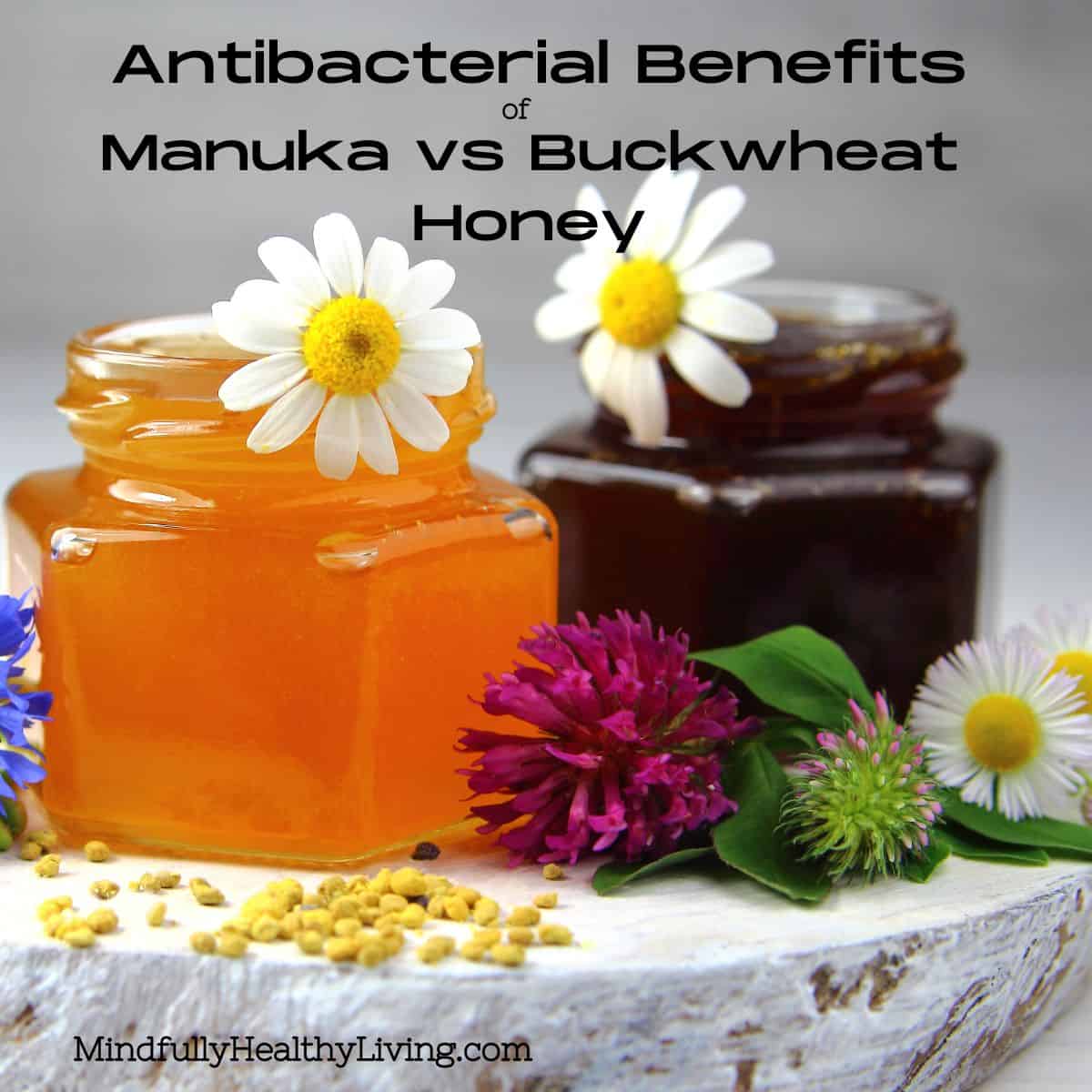
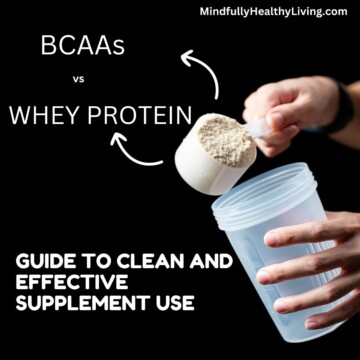


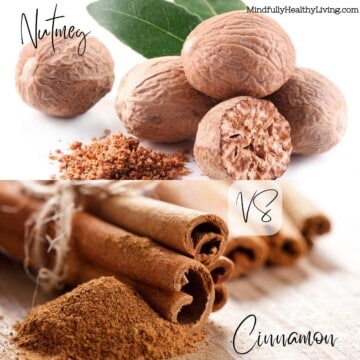

Debbie says
I love learning more about natural products like honey as well as their ability to help with healing and health. The information was great on the antibacterial benefits of buckwheat honey versus manuka honey. Thank you for sharing!
Natalie Perry says
Thank you so much! I appreciate your comment! Natural health is our goal 🙂
Melissa says
This is so interesting! I knew there were different types of honey, but I never knew much about the differences. Thank you for the helpful information!
Natalie Perry says
You are very welcome 🙂